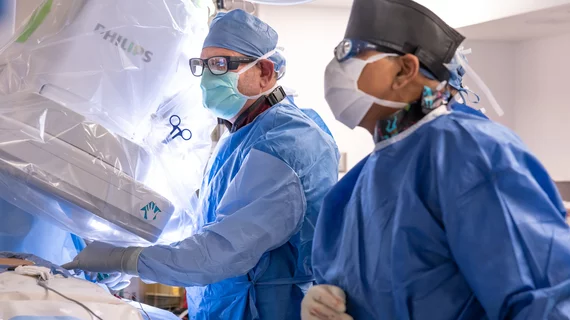Cleveland Clinic cardiologists make history, become first in world to implant new heart failure device
Two veteran cardiologists from Cleveland Clinic have performed the first heart procedure of its kind, successfully implanting a new dual cardiac device in a patient presenting with heart failure symptoms.
The procedure was part of the INTEGRA-D clinical trial, a multicenter study of the safety and effectiveness of the Optimizer Integra CCM-D System from Impulse Dynamics. The Optimizer Integra CCM-D System combines two established cardiac therapies—cardiac contractility modulation (CCM) and an implantable cardioverter defibrillator (ICD)—into a single device. It is designed to minimize symptoms associated with heart failure and heart rhythm issues, improving the patient’s quality of life, and its long battery life could help limit the need for additional procedures.
Bruce Wilkoff, MD, director of cardiac pacing and tachyarrhythmia devices at Cleveland Clinic, and Niraj Varma, MD, PhD, an electrophysiology specialist and professor of medicine at Cleveland Clinic Lerner College of Medicine, led the procedure on Wednesday, May 17.
“This could be an important advancement for heart failure patients, requiring just one procedure to deliver two important therapies and prevent sudden cardiac death,” Wilkoff, principal investigator for the INTEGRA-D trial, said in a prepared statement. “The hope is that this rechargeable technology—with a potential battery life of up to 20 years—will significantly reduce the need for replacement procedures.”
“We are looking forward to studying this new technology to determine its potential to advance treatments for patients living with heart failure,” added Varma, national primary investigator.
The INTEGRA-D clinical trial will examine data from 300 patients treated at one of 75 facilities, focusing on the device’s ability to treat heart failure and episodes of ventricular tachycardia/ventricular fibrillation at the same time. Patients will be followed for a minimum of two years.
“Today’s announcement is another example of our commitment to a continuous pace of innovation to build a comprehensive platform in interventional heart failure and help improve the lives of many patients that suffer from this debilitating disease,” Simos Kedikoglou, MD, CEO of Impulse Dynamics, said in a separate statement about the procedure. “We are proud to partner with physicians at leading centers around the world to conduct important research on this first-of-its-kind rechargeable combination device designed to address a major unmet need of a large patient group.”

